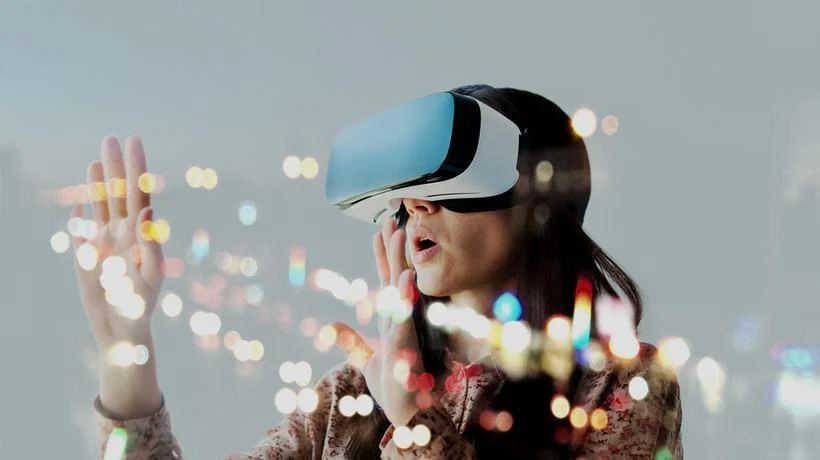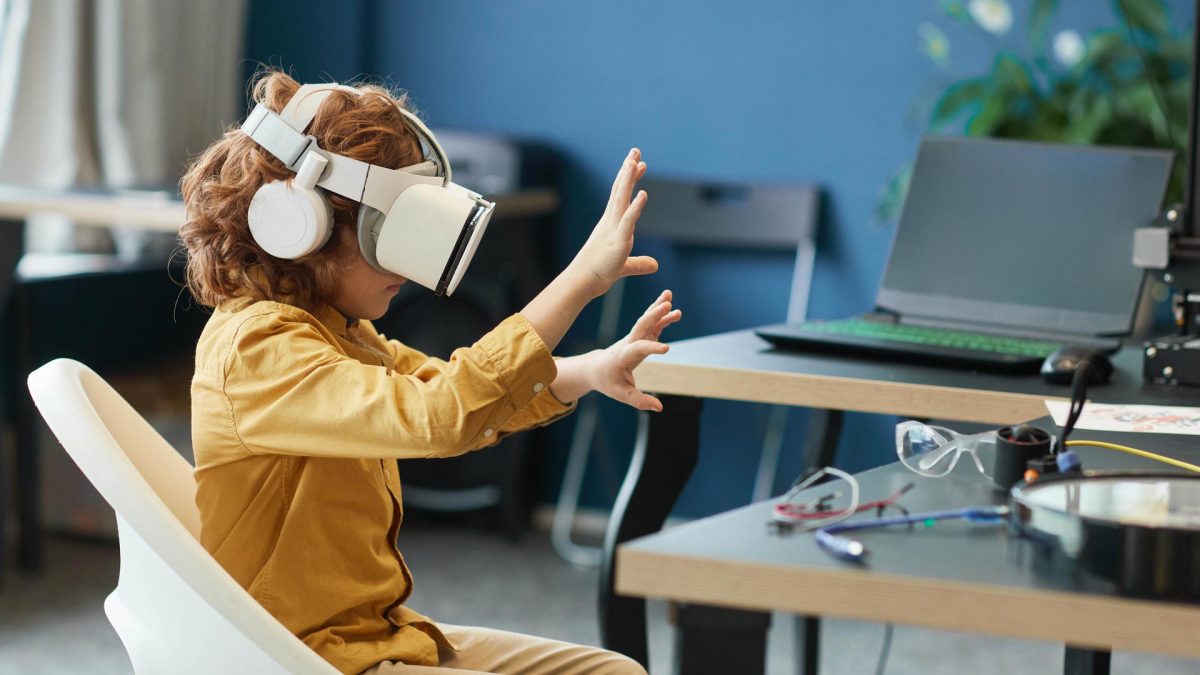When we immerse ourselves more deeply in XR, it positively impacts our leadership, management, and learning skills. This, in turn, enhances our connections and well-being in the real world. In today’s episode, our guest, Caitlin Krause, an author and XR designer, specializes in the importance of presence. Caitlin authored “The Importance of Presence” chapter in The Global Resource Guide to XR Collaboration. Host Julie Smithson, the XR for Learning podcast host, engages Caitlin in a conversation about the significance of presence in XR environments.
Julie: Greetings, I’m Julie Smithson, your XR for Learning podcast host. I’m excited to explore how XR technologies can revolutionize learning and teaching for everyone. Today’s guest is Caitlin Krause, a globally recognized learning and leadership expert, author, and keynote speaker. Caitlin’s book, “Mindful by Design,” delves into leveraging mindfulness, storytelling, and design principles for deeper connections in communities. She is also the founder of MindWise, focusing on experiences that enhance awareness, emotional intelligence, and creative collaboration. Thank you, Caitlin, for joining me today. I’m eager to dive into our conversation.
Caitlin: Thank you, Julie. It’s a pleasure to be here.
Julie: Today, we’re discussing a crucial topic that might not be on everyone’s mind, but it’s certainly on ours. I’ll hand it over to you to provide an introduction and share your impact in this space.

Caitlin: Certainly. This is a time of transitions and adaptation, a crucial moment to examine the notion of connection. My mission, founded in MindWise five years ago and now deeply involved in immersive technology and XR collaboration, is to empower humanity through connection. With a background in both technology and learning design, I focus on the human factor, exploring how we can use technology to empower ourselves. “Connection” is key – internally, with our purpose and values, and externally, with others and diverse experiences. The distinction between personal and professional lives is blurred, particularly in today’s work-from-home environment. This fluidity requires us to consider how technology can be a tool for empowerment in both spheres.
Julie: Absolutely. The recent shift to remote work and reliance on technology, especially platforms like Zoom, has prompted individuals to navigate and adapt to digital tools. Your story about your mother’s journey into using Zoom highlights the transformation from intimidation to curiosity, fostering a compassionate environment where people share their experiences and troubleshoot together. This rapid adaptation, akin to lean methods and rapid prototyping in business, requires a mindset shift towards curiosity and away from self-judgment. It’s a fascinating time for people using new platforms, and the process involves learning, iterating, and overcoming challenges.
Caitlin: Indeed, it’s a raw and transformative time. The intimidation some may feel toward new platforms can turn into curiosity, fostering compassion and understanding as individuals explore these technologies. Many business leaders, accustomed to rapid prototyping and lean methodologies, find parallels in troubleshooting and iterating. It aligns with mindfulness principles, encouraging curiosity over harsh self-criticism. Your mother’s experience with Zoom illustrates the beauty of trying new things and embracing imperfections. It’s a moment of shared learning and generosity among communities, reinforcing the importance of presence in these virtual interactions.
Julie: The sudden shift to remote work has prompted individuals to embrace technology, like Zoom, even those who may not consider themselves tech-savvy. As people navigate these platforms, they find support within communities, sharing troubleshooting tips and fostering a spirit of curiosity. The process involves rapid prototyping and iterating, much like business practices, and aligns with mindfulness principles, emphasizing curiosity over harsh self-judgment.
Caitlin: Absolutely. The current environment is an opportunity to transform intimidation into curiosity. Many individuals, even those not traditionally tech-savvy, are engaging with new platforms like Zoom. This process of exploration is marked by imperfections, but it fosters a spirit of curiosity and shared learning within communities. Business leaders, accustomed to rapid prototyping and iteration, resonate with this approach. The journey becomes a collaborative experience, aligning with mindfulness principles that encourage curiosity over self-criticism.
Julie: The sudden shift to remote work has prompted individuals to embrace technology, like Zoom, even those who may not consider themselves tech-savvy. As people navigate these platforms, they find support within communities, sharing troubleshooting tips and fostering a spirit of curiosity. The process involves rapid prototyping and iterating, much like business practices, and aligns with mindfulness principles, emphasizing curiosity over harsh self-judgment.

Julie: Absolutely. So much has changed in just a few weeks. We’re about three months into this remote work situation, and it’s crucial to recognize where we are today. People are working remotely, dealing with technologies like Zoom, and this presents challenges but also opportunities for transformation. Let’s explore the importance of presence in this context. Where do we start?
Caitlin: I’d love to delve into that. Your story about your mother managing a Zoom call with her tai-chi group at 76 is heartwarming. It illustrates the transformation from frustration to capability. It speaks to the need for people to become comfortable with and humanize digital technologies. The ability to trust technology is essential for productivity and effective communication. Your mother’s journey highlights the need for individuals to become immersed in technology and how comfort and trust are pivotal in this transformation. It’s a timely topic, given the current situation where technology plays a central role in our lives.
Julie: Indeed. The story of my mother’s journey with Zoom is a testament to the potential for individuals to overcome the initial challenges of technology and become comfortable and confident users. It emphasizes the importance of trust and immersion in technology, especially in the context of remote work and communication. This transformation is relevant and timely, considering the significant role technology plays in our daily lives.
Caitlin: I find the concept of humanics particularly relevant here. It’s about understanding the digital side and recognizing that, in these transactions, we are being evaluated more closely. What does it take for individuals to become comfortable enough and human enough to engage in these digital technologies for various purposes? Your mother’s experience is a powerful example, showcasing the potential for individuals to not only adapt but also to trust and be productive in these digital spaces. How can we foster this comfort level and prepare individuals for this transformative journey?
Julie: That’s a critical question. Your mention of “humanics” resonates deeply. As we engage with various platforms for collaboration and communication, understanding the digital side becomes crucial. The evaluation and tracking that come with technology usage highlight the need for individuals to develop comfort and trust. Your mother’s successful Zoom experience demonstrates the transformative potential of individuals embracing digital technologies. It’s essential to explore how we can support and prepare people to confidently navigate these spaces and enhance their well-being in the process.
Caitlin: Absolutely. I’ve been reflecting on this while writing my upcoming book on presence, leadership, and learning, and how to design experiences that align with the best considerations. Presence, coupled with identity, is a dynamic interplay. It involves adapting and recognizing the plasticity of the process. As an experienced designer and architect of experiences, I’ve worked on projects emphasizing relationship building in virtual spaces.

